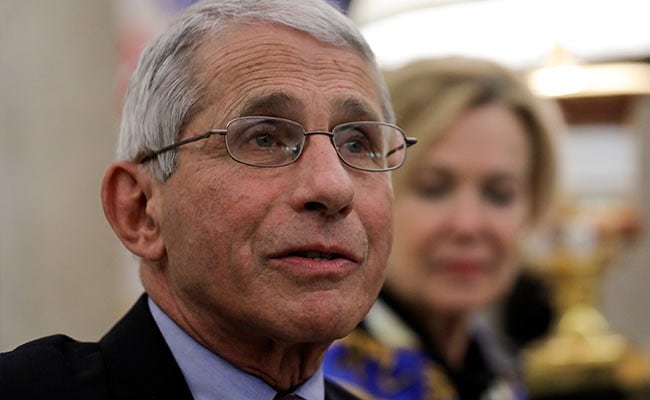
Washington:
Leading US infectious disease expert Anthony Fauci on Tuesday warned Congress that a premature lifting of lockdowns could lead to additional outbreaks of the deadly coronavirus, which has killed 80,000 Americans and brought the economy to its knees.
Fauci, director of the National Institute of Allergy and Infectious Diseases, told a US Senate panel that the virus epidemic is not yet under control in areas of the nation.
"I think we're going in the right direction, but the right direction does not mean we have by any means total control of this outbreak," Fauci said during hours of testimony.
He urged states to follow health experts' recommendations to wait for signs including a declining number of new infections before reopening.
President Donald Trump has been encouraging states to end a weeks-long shuttering of major components of their economies. But senators heard a sobering assessment from Fauci, when asked by Democrats about a premature opening of the economy.
The veteran doctor, who has worked under Republican and Democratic administrations, noted progress in the fight against a virus that the medical world is still trying to understand.
He noted a slowing in the growth of cases in hotspots such as New York, even as other areas of the country were seeing spikes.
Some states already have begun reopening their economies and others have announced plans to phase that in beginning in mid-May, even as opinion polls show most Americans are concerned about reopening too soon.
"There is a real risk that you will trigger an outbreak that you may not be able to control and, in fact paradoxically, will set you back, not only leading to some suffering and death that could be avoided, but could even set you back on the road to try to get economic recovery," Fauci said of premature steps.
Democrats on the health committee largely concentrated on the risks of opening the U.S. economy too soon, while Republicans downplayed that notion, saying a prolonged shutdown could have serious negative impacts on people's health and the health of the economy.
Asked whether college students can feel safe if classes resume on campuses in late August or early September, Fauci said that expecting a treatment or vaccine to be in place by then would be "a bridge too far."
The COVID-19 respiratory disease caused by the new coronavirus has infected more than 1.3 million Americans and killed more than 80,600.
Fauci, a member of Trump's coronavirus task force, told the Senate Health, Education, Labor and Pensions Committee that the nation's efforts to battle the deadly virus and the COVID-19 disease it triggers should be "focused on the proven public health practices of containment and mitigation."
Fauci, 79, testified remotely in a room lined with books as he self-quarantines after he may have come into contact with either of two members of the White House staff who were diagnosed with COVID-19. He noted that he may go to the White House if needed.
Medical researchers have been scrambling to find not only an effective vaccine for coronavirus but also drugs to treat it until a vaccine comes to market.
Fauci noted only "modest" results in tests of Gilead Sciences Inc's remdesivir drug on hospitalized patients.
"All roads back to work and back to school run through testing and that what our country has done so far on testing is impressive, but not nearly enough," Lamar Alexander, the Republican chairman of the Senate committee, told the hearing.
Alexander, who is self-quarantining in his home state of Tennessee for 14 days after a member of his staff tested positive, chaired the hearing virtually.
Trump, who previously made the strength of the economy central to his pitch for his November re-election, has encouraged states to reopen businesses that had been deemed non-essential amid the pandemic.
Senator Patty Murray, the senior committee Democrat, criticizing aspects of the administration's response to the pandemic, said Americans "need leadership, they need a plan, they need honesty and they need it now, before we reopen."
MD Mujeeb Subhan News
- Get link
- X
- Other Apps
Labels
Coronavirus
Labels:
Coronavirus
- Get link
- X
- Other Apps



Comments
Post a Comment
if you have any doubts. Please let me know